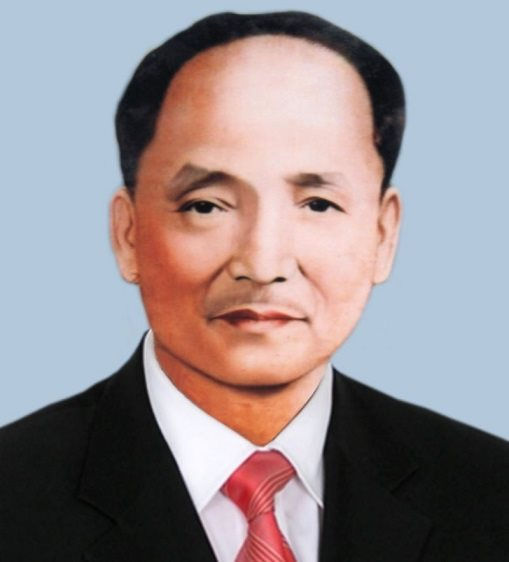Hoang Quoc Viet - typical historical and cultural celebrity of Bac Ninh people
Hoang Quoc Viet is a former Secretary of the Northern Party Committee, Chairman of the Vietnam General Trade Union (now the Vietnam General Confederation of Labor), Procurator General of the Supreme People's Procuracy, Chairman of the Central Committee of the Fatherland Front Vietnam. He is a revolutionary activist belonging to the class of senior cadres of the Party, having made great contributions to the Vietnamese revolution.

Comrade Hoang Quoc Viet (Internet source).
Comrade Hoang Quoc Viet, whose real name is Ha Ba Cang, was born on May 28, 1905 in Dap Cau commune, Vo Giang district, Bac Ninh province (now Dap Cau ward, Bac Ninh city). He was one of the first revolutionary workers of the Vietnamese working class.
In 1922, he studied at Hai Phong Practical Technology School and joined the struggle movements of students, youth, and port workers. In 1925, when he was in his third year, he participated in the anti-lockdown movement and joined a protest group against the colonial government's death sentence of patriotic journalist Phan Boi Chau. Expelled from school, in 1926, he worked as a cold worker at Phan Me mine (Thai Nguyen) for 3 months, then returned to work at Mao Khe coal mine. In 1927, he returned to work at the Hai Phong Ca Rong Department and participated in revolutionary activities. During this time, he met with veteran revolutionary soldiers such as Ngo Gia Tu, Nguyen Duc Canh, Luong Khanh Thien.
In July 1928, Hoang Quoc Viet was admitted to the Vietnam Revolutionary Youth Union. In mid-1929, he was sent to the South to work with comrades Ngo Gia Tu and Le Van Luong. By the end of 1929, according to the policy of the Party, he was introduced to work at the Chantilly ship the of the France in order to find his way to France to learn and connect with the workers' movement and the French Communist Party.
In February 1930, he was an interim member of the Central Committee. In April 1930, he was arrested by the French colonialists in Hai Phong and brutally tortured, broke his leg, and had to be disabled until later.
In the second half of 1930, he was sentenced to life imprisonment by the French colonialists; At the end of 1930, he was exiled to Con Dao together with comrades Nguyen Van Cu, Le Duan, Pham Van Dong, Le Duc Tho... In Con Dao, together with comrades in the Party, he carried out the construction of the Party organization in prison, implementing the "Turn the prison into a revolutionary school".
At the end of 1936, comrade Hoang Quoc Viet and a number of other revolutionary soldiers were freed. In early 1937, right after he was released from prison, he together with some other comrades organized the publication of a number of public newspapers in Hanoi such as: Ban Dan, Thoi The... and was assigned to work with him. Truong Chinh was in charge of the Party newspapers in Tonkin. In May 1937, comrade Hoang Quoc Viet was appointed Secretary of the Tonkin Party Committee.
In 1941, he attended the Eighth Party Central Committee Conference convened and chaired by President Ho Chi Minh, and he was appointed to the Party Central Committee. In August 1945, Comrade Hoang Quoc Viet was elected to the Standing Committee of the Party Central Committee.
After that, on behalf of the Party Central Committee and Viet Minh General Headquarters, a delegation led by comrades Hoang Quoc Viet and comrade Cao Hong Lanh went to the South. In February 1946, Comrade Hoang Quoc Viet returned to Pac Bo and from July 1947 was a member of the Standing Committee of the Party Central Committee directly in charge of the Viet Minh Headquarters.
From March 1951 to 1957, at the Second National Congress of Deputies of the Party, he was elected to the Central Committee of the Party and the Politburo, in charge of mass mobilization, the front and as Chairman of the Party Central Committee. President of the General Trade Union of Vietnam. In 1960, he was elected as the Chief Procurator of the Supreme People's Procuracy, joined the Presidium of the Central Committee of the Vietnam Fatherland Front, and was the President of the Vietnam - China Friendship Association.
In December 1976, during the 4th Congress of the Communist Party of Vietnam, he was elected to the Central Committee and continued to hold many positions: Chairman of the Presidium of the Central Committee of the Vietnam Fatherland Front (1977) ), Honorary Chairman of the Central Committee of the Vietnam Fatherland Front (1983), was a member of the V, VI, VII, VIII National Assembly.
Comrade Hoang Quoc Viet is an indomitable proletarian revolutionary. He is also one of the very few senior leaders of the Communist Party of Vietnam, throughout his life, he has continuously participated in key leadership positions of the Party since the early days of the Party's establishment. Your whole life has been associated with and made positive contributions to the revolutionary flow of the Vietnamese proletariat in many twists and turns of the nation's history in the twentieth century. At the same time, the political life of Hoang Quoc Viet has left many historical marks in common with famous figures such as: Ho Chi Minh, Ngo Gia Tu, Nguyen Van Cu, Nguyen Duc Canh, Tran Phu, Ton Duc Thang, Vo Nguyen Giap, Truong Chinh, Pham Van Dong…
Comrade Hoang Quoc Viet died on December 25, 1992 in Hanoi. For his great and especially outstanding contributions to the resistance war for national independence, national reunification and national construction and defense, he was awarded the Gold Star Order along with many other noble orders and medals.
To remember the great contributions of Comrade Hoang Quoc Viet to the Vietnamese revolution, there are roads in provinces and cities such as Hanoi, Bac Ninh, Ho Chi Minh City, Hue, Can Tho, and Quang Ninh having named comrade. Especially when coming to Bac Ninh city, visitors will visit the park and monument named Hoang Quoc Viet, a place to commemorate and honor comrade - a resilient communist for life for the Party - for the People.






